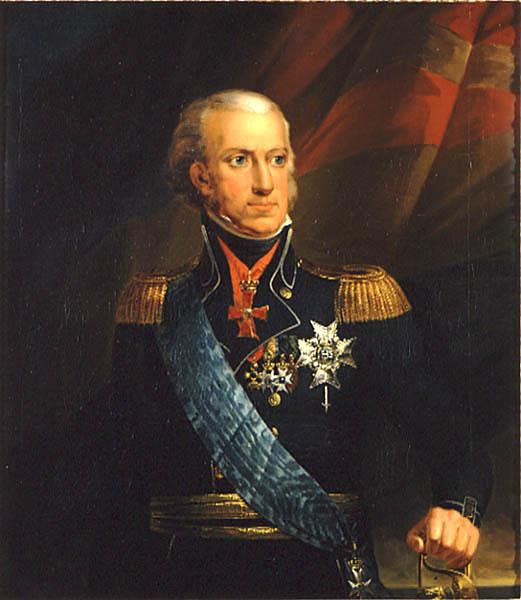<Back to Index>
- Economist Walt Whitman Rostow, 1916
- Novelist Anni Viktoria Karlsson (Blomqvist), 1909
- King of Sweden Charles XIII, 1748
PAGE SPONSOR

Charles XIII & II also Carl, Swedish: Karl XIII (Stockholm, 7 October 1748 – Stockholm, 5 February 1818), was King of Sweden (as Charles XIII) from 1809 and King of Norway (as Charles II) from 1814 until his death. He was the second son of King Adolf Frederick of Sweden and Louisa Ulrika of Prussia, sister of Frederick the Great.
Though known as King Charles XIII in Sweden, he was actually the seventh Swedish king by that name, as his predecessor Charles IX (reigned 1604 – 1611) had adopted a numeral after studying a fictitious history of Sweden.
Prince Charles was appointed grand admiral when he was but few days old. He was described as a good dancer at the amateur theatre of the royal court. Reportedly he was not very close to his mother; the Queen preferred her younger children, Sophie Albertine and Frederick Adolf, but he and his elder brother Gustav were described as close. In 1772 he cooperated in the revolutionary plans of his elder brother, King Gustav III of Sweden and as a sign of recognition, was appointed Duke of Södermanland.
He was described as dependent of others, easily influenced, weak and pleasure loving. He was very interested in the supernatural, secret societies and mysticism. It is said that he was one of the best clients of the celebrated fortune teller Ulrica Arfvidsson and even asked her for political advice, and he also favored the medium Henrik Gustaf Ulfvenklou, who made a great success as a medium in the city's aristocracy during the season 1783 – 84 and had great influence over the duke. He was also a member of the Freemasons.
Charles was given several official tasks during his period as duke. In 1777, he served as regent during Gustav III:s stay in Russia, in 1780 he served as formal chief commmander during the King's stay in Spa. On the outbreak of the Russo-Swedish War of 1788 he served with distinction as admiral of the fleet, especially at the battles of Hogland (7 June 1788) and Öland (26 July 1789). On the latter occasion he would have won a signal victory but for the unaccountable remissness of his second - in - command, Admiral Liljehorn.
In 1785, he was given the proposition to become Duke of Courland by the nobility of the Duchy of Courland and given the support of Gustav III, but the plans never materialized.
Charles was in close connection to the opposition against Gustav III, and it is debated whether he knew and supported the plans to assassinate the King.
On the assassination of Gustav III in 1792, Charles acted as regent of Sweden till 1796 on behalf of his nephew, King Gustav IV, who was a minor when his father was shot in the Stockholm opera. The regent de facto, however, was in fact Gustaf Adolf Reuterholm, whose influence over him was supreme. These four years have been considered the perhaps most miserable and degrading in Swedish history (an Age of Lead succeeding an Age of Gold, as it has well been called) and may be briefly described as alternations of fantastic jacobinism and ruthless despotism.
On the coming of age of Gustav IV Adolf of Sweden in November 1796, the duke's regency ended. In 1803, the Boheman affair caused a severe conflict between Gustav IV Adolf and the ducal couple. The mystic Karl Adolf Boheman (1764 - 1831) had been introduced to the spouses by Count Magnus Stenbock in 1793 and gained great influence by promising to reveal scientific secrets about the occult. Boheman inducted them to a secret society and founded what he described as a branch of the Freemasons in 1801, where both sexes where accepted as members, and to which the Counts and Countesses Ruuth and Brahe as well as the mother of the queen where introduced. Boheman was arrested upon an attempt to recruit the monarch, who accused him of revolutionary agendas and expelled him. The ducal couple was exposed to an informal investigation by the monarch, and the duchess where questioned in the presence of the royal council. In 1808, he was again chief commander during Gustav IV Adolf's stay in Finland.
On 13 March 1809, those who had dethroned Gustav IV Adolf appointed him regent, and he was finally elected king by the Riksdag of the Estates. But by this time he was prematurely decrepit, and Crown Prince Jean-Baptiste Bernadotte took over the government as soon as he landed in Sweden in 1810. By the Union of Sweden and Norway on 4 November 1814 Charles became king of Norway under the name Carl II of Norway. After eight years as king only by title, Charles died without a natural heir on 5 February 1818, and Bernadotte succeeded him as King Charles XIV John.
In 1774, his brother arranged a marriage with his cousin, Hedwig Elizabeth Charlotte of Holstein-Gottorp. His marital relationship was very distant; although initially fond of his beautiful and lively bride, they lived most of their lives separated and both had extramarital affairs. During his old age, when he became king, he began to follow her around, irritating her by asking the same questions repeatedly. Charles was talked about as having a whole harem of mistresses, including noblewomen such as Augusta von Fersen and singers and actresses such as Charlotte Eckerman. One of his best known mistresses was Charlotte Slottsberg, who also had influence over him. As a king, his mistress was the noblewoman Mariana Koskull.
He was the 872nd Knight of the Order of the Golden Fleece in Spain.
He married his cousin Hedwig Elizabeth Charlotte of Holstein-Gottorp (1759 – 1818), on 7 July 1774 in Stockholm, but both of their children died in infancy. With his mistress, Augusta von Fersen, he had a son.